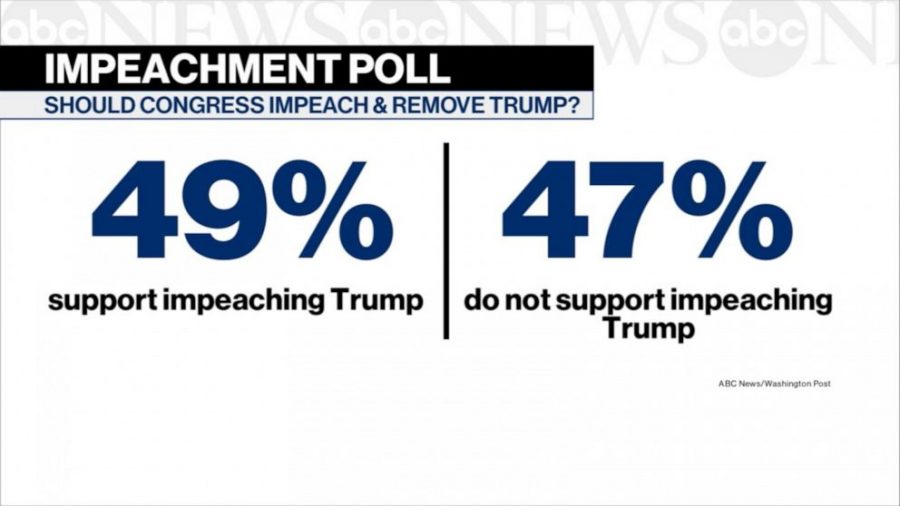Trump Looming Impeachment Leads To More Political Uncertainty
What’s happening with Donald Trump? Will he be impeached? What does that even mean? Find out that and more in this guide to Trump’s potential impeachment.
Regardless of political alignment, it’s hard to deny that the Donald Trump presidency has been chaotic.
The uncertainty of the administration, the controversial tweets, the extreme press attention; every day it feels like everything one knew before is useless. It seems so raw and bare. It’s American in the most beautiful way.
If one views Trump’s time in office as a movie or play, the story is facing its climax with the ongoing impeachment process.
Why is he facing impeachment charges? Will Trump get impeached and removed from office? What needs to happen first? Is it realistic? How long would it take? These questions barely scratch the surface about how deep this issue is.
To help break it down, The Impact contacted Eric Diorio, a professor of Political Science in America at Mercy College.
Two presidents have faced formal impeachment proceedings, both for “high crimes and misdemeanors” and contrary to popular belief, one is not Richard Nixon. The first was Andrew Johnson in 1868 for attempting to remove his Secretary of War. Congress could not earn two-thirds vote to do so. Bill Clinton faced charges in 1998 for sexual harassment claims by Paula Jones and a sexual relationship with a White House intent, Monica Lewinsky. Congress did not garner two-thirds of the vote to impeach.
Nixon impeachment proceedings began in 1973 but were formally approved in July 1974. He resigned from office in August.
“President Clinton interfered with witnesses and was far from transparent, yet he was a Boy Scout compared to Nixon. Richard Nixon brazenly obstructed justice in his efforts to stonewall.”
Looking past the current White House’s refusal to work with the legislative branch, America has a history of President impeachments.
***
The year is 1868. America has only recently come back together, following the bloodiest conflict in the nation’s history. And President Johnson is on the verge of removal from the Presidency.
Following the assassination of the 16th President, Abraham Lincoln, Johnson made a name for himself as the 17th POTUS for all the wrong reasons.
“One of the articles drawn against Andrew Johnson was his rude and demeaning attitude toward members of Congress. In other words, Johnson was impeached, in part, for being a jerk,” explained Diorio.
In 1867, Congress passed the Tenure of Office Act. This made Senate authority required for any removal of a Senate-appointed government official.
Johnson asked for the Senate to fire his Secretary of War; they refused, so Johnson fired him, regardless. This opened a golden opportunity for Johnson’s impeachment, says Diorio.
Johnson was impeached, but what’s important to remember in this situation is that impeachment doesn’t automatically remove one from office.
Impeachment just means that an official has been charged, officially.
Following the House voting on whether the said government official should be impeached, assuming the vote wins, it moves to the Senate. Then another vote is taken; if it goes through, it would see that official removed from their position.
To say that the 17th President, Andrew Johnson, dodged being the first President to ever be removed from office would be an understatement. Needing a supermajority (two-third of the vote) the Senate final tally ended up being 35-19, meaning that Johnson was one vote away from being removed from office.
The only other case is one much more familiar to Americans, mostly because it’s happened in the last century: Bill Clinton.
As Diorio continued following his earlier point about Johnson, “In 1998, some Republican lawmakers argued Clinton should have been impeached for disgracing the dignity of the Office.”
Following Monicagate, which saw the 42nd POTUS have secret affairs with a White House Intern, Clinton committed perjury by lying while under oath during a trial about the charges.
Clinton, like Johnson, was also impeached, but not removed from office. While his Senate vote wasn’t determined by a single vote, Clinton is the second, and the latest President to face impeachment to this point.
Nixon, who would have likely been the only President to be removed from office for his role in the Watergate Scandal, avoided serious punishment by resigning and then being pardoned by the new President, Gerald Ford.
***
Heading back into this century, Donald Trump has seemingly faced every controversy in the book. Yet the talks of a Trump impeachment have only seemed to gain steam over the last few months.
Diorio explained that, like much of the Constitution, what justifies as “impeachment worthy” is open to interpretation.
“The constitution is rather vague. The President shall be impeached for treason or high crimes or misdemeanors. Treason is what it is, but “high crimes” is, in my opinion, intentionally obtuse and this leaves the door open for interpretation. For the most part, The House can impeach a President for virtually anything.”
But in the case of President Trump, what constitutes “anything?”
The term “Quid pro quo” has been thrown around a large amount with the news of Trump facing potential impeachment. What this means, in simple terms, means a favor for another favor, but with one party holding leverage over the other.
The favor that’s causing the controversy is $400 million of military aid (which was being held on hold) in exchange for Ukraine to investigate Hunter Biden, son of the Democratic candidate and former Vice President, Joe Biden, in news that was leaked this past July by an unnamed whistleblower.
Trump and the new President of Ukraine, and also once an actor, Volodymyr Zelensky, were the two subjects at hand during this call.
Trump has claimed that Biden abused his powers while in office as VP. Hunter Biden served on the board of a Ukranian gas company when an investigation would have a look into the said company, said investigator was shortly after fired. Trump claims that Biden abused his powers to get him fired.
Trump held money that was needed for the Ukranian people for political gain. This is the claim made by Nancy Pelosi and the rest of those fighting for potential Trump impeachment.
On his attempts to delegitimize the impeachment claims, the refusal of the Trump administration to work with Congress also has a historical background with Nixon, as Diorio mentions.
“Among other issues, he snubbed Congressional subpoenas, most notable of which was his refusal to release damning White House recordings. He cited Executive Privilege and tried to make the case the President of the United States was, more or less, above the law. In the landmark case Nixon v. The United States, the Supreme Court ruled the President is not above the law and they forced the President to turn over the tapes.”
But what happens now?
This is perhaps where this process becomes difficult. While this was already mentioned slightly before, attempting to get a government official impeached is extremely difficult.
“As per Article I, impeachment requires only a simple majority vote in the House of Representatives. In other words, impeaching the president is not as difficult as one would presume. There are 435 seats in the House of Representatives, the Democrats control 234 of them, and this means they can impeach Trump without a single Republican vote,” said Diorio.
But again, impeachment does not mean automatic removal from office.
“After the House moves to impeach the President, the trial takes place in the Senate where a 2/3 vote is required to convict or remove the President from the Oval Office. Andrew Johnson and Bill Clinton were both impeached by the House, yet because the Senate elected to acquit, both were able to continue to serve the balance of their terms.”
Alright then, does Diorio believe there any chance Trump gets removed from office?
While the House vote is all but looking guaranteed, the Senate vote is where the issue gets complicated.
Of the 100 seats in the Senate, 53 are held by Republicans, meaning that to get the two-third vote required for Trump’s removal of office, it would not only require all 45 Democrats and two independents to vote in unison, but for 20 Republicans to vote against their own party.
This is where things pick up, at least according to Diorio.
“This is the million-dollar question, right? At this point, it is a near certainty Trump will be impeached, however, it is unlikely twenty Senate Republicans will vote for his removal. It should be noted, early in the Watergate proceedings the GOP and public opinion were solidly behind Nixon and as we learn more, as the public did then, attitudes can change.”
Diorio continued to state that Trump’s legal situation is even murkier than it may appear.
“I cannot say Trump will or will not be charged with crimes, but we know he was named as an unindicted co-conspirator in the Southern District of New York during Michael Cohen’s sentencing hearing and we also know Robert Mueller told Congress he would have charged President Trump with Obstruction of Justice if not for the Office of Legal Counsel policy on the matter. As crazy as it may sound, the OLC policy states that they cannot charge a sitting president with a crime.”
With about a year to go until the 2020 Presidential election, uncertainty is the certainty in this case.
Regardless of removal from office, Trump may have other potential issues facing him down after his time in the White House is over, according to Diorio, “Considering impeachment as a political and not a criminal proceeding, the policy dictates the President to be impeached, removed, and then charged with relevant crimes. It is entirely possible Trump is already facing sealed indictments that will be unsealed when he leaves the office.
“Either way, it should be interesting.”
About the Contributor

Steven Keehner, Impact Staff
Steven Keehner was the Managing Editor of the greatest publication on the Hudson.
Hailing from the mediocre Town of Oyster Bay, New York, he enjoys...








